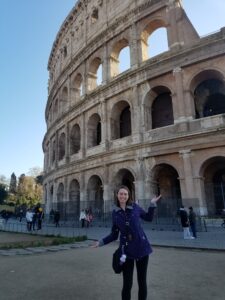 January 2020 was one of the best months of my life. Other than Canada, I had never been outside of the United States before, so flying to Italy for a month long study abroad trip was a very new and exciting experience for me. As I sit here reflecting on my time abroad, I can’t help but admire how much I have grown. Specifically, I gained a lot of confidence in my ability to navigate a foreign country. I never really had to use public transportation back home, so I was nervous not only about using it in general, but also having to use it in unfamiliar cities in a foreign country. Within the first week, however, I learned that public transportation is very easy to navigate, and I became confident in my ability to use public transportation– whether it be boat, bus, or train– to get around the city.
January 2020 was one of the best months of my life. Other than Canada, I had never been outside of the United States before, so flying to Italy for a month long study abroad trip was a very new and exciting experience for me. As I sit here reflecting on my time abroad, I can’t help but admire how much I have grown. Specifically, I gained a lot of confidence in my ability to navigate a foreign country. I never really had to use public transportation back home, so I was nervous not only about using it in general, but also having to use it in unfamiliar cities in a foreign country. Within the first week, however, I learned that public transportation is very easy to navigate, and I became confident in my ability to use public transportation– whether it be boat, bus, or train– to get around the city.
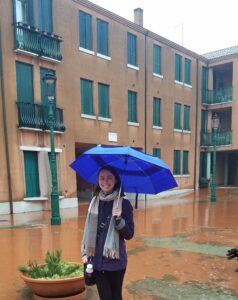 Most of the trip, however, was spent walking from place to place. Some of my favorite memories from the trip was walking around the various cities with no destination in mind, getting lost but also never actually feeling lost because I felt confident in my ability to find familiar landmarks and get home that way. I grew a lot from this exploring because, prior to this trip, I had never really had a chance to “get lost” in a city because my goal was always to drive from point A to point B and stay on a schedule. I did not realize how easy it would be to orient myself in new environments and how relaxing it would be to just wander without a set itinerary. Getting lost is a very rewarding experience.
Most of the trip, however, was spent walking from place to place. Some of my favorite memories from the trip was walking around the various cities with no destination in mind, getting lost but also never actually feeling lost because I felt confident in my ability to find familiar landmarks and get home that way. I grew a lot from this exploring because, prior to this trip, I had never really had a chance to “get lost” in a city because my goal was always to drive from point A to point B and stay on a schedule. I did not realize how easy it would be to orient myself in new environments and how relaxing it would be to just wander without a set itinerary. Getting lost is a very rewarding experience.
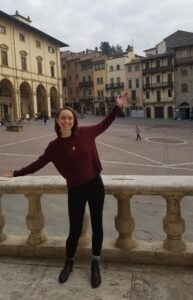 Throughout the trip, I also became more confident in my ability to communicate with Italians. When I first came to Italy I felt really intimidated by the idea of being immersed in foreign language because I had never had to deal with that, but I quickly learned that Italians are really helpful if you attempt to talk to them in Italian. I became more confident using basic Italian phrases, so much so that saying “grazie” instead of “thank you” is a natural response. However, I did not get as much experience speaking Italian as I had hoped because most Italians speak English and I never ran into a situation where I had to communicate with someone who did not speak any English. The fact that so many Italians were able to speak to me in
Throughout the trip, I also became more confident in my ability to communicate with Italians. When I first came to Italy I felt really intimidated by the idea of being immersed in foreign language because I had never had to deal with that, but I quickly learned that Italians are really helpful if you attempt to talk to them in Italian. I became more confident using basic Italian phrases, so much so that saying “grazie” instead of “thank you” is a natural response. However, I did not get as much experience speaking Italian as I had hoped because most Italians speak English and I never ran into a situation where I had to communicate with someone who did not speak any English. The fact that so many Italians were able to speak to me in 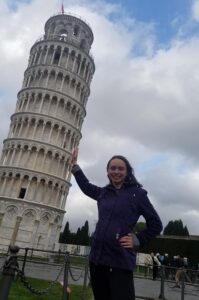 English reminds me of how privileged I am to know English and be able to use my native language to communicate with people in a foreign country. Really, the only time I was challenged was when I was trying to read labels at the grocery store. I was easily able to feel comfortable with communication because I was not forced to learn a new language, which I feel is both a blessing and a curse. Regardless, I am still grateful that I was able to learn some new phrases and get a little bit of practice using Italian.
English reminds me of how privileged I am to know English and be able to use my native language to communicate with people in a foreign country. Really, the only time I was challenged was when I was trying to read labels at the grocery store. I was easily able to feel comfortable with communication because I was not forced to learn a new language, which I feel is both a blessing and a curse. Regardless, I am still grateful that I was able to learn some new phrases and get a little bit of practice using Italian.
Finally, I also enjoyed immersing myself in the Italian eating culture. At the beginning of the trip we would eat dinner at 7:30PM, which felt really late to us but was considered really early  for Italians. By the end, however, I was eating dinner closer to 9:00PM! I tried a lot of new foods on this trip as well, including focaccia bread, tiramisu, espresso, spritzes, and lots of wine. Even if I did not always like the food I tried, I was still proud of myself for trying new foods. Some of the foods even started to grow on me. For example, I came into this trip with a strong hatred for wine but now, while I’m still not a fan of red wines, I do enjoy drinking Proseco and Chardonnay. Overall, adopting the Italian food customs helped me to feel like I was immersing myself in a new culture, and gaining that experience helps me to better appreciate the cultural differences between Italy and Minnesota.
for Italians. By the end, however, I was eating dinner closer to 9:00PM! I tried a lot of new foods on this trip as well, including focaccia bread, tiramisu, espresso, spritzes, and lots of wine. Even if I did not always like the food I tried, I was still proud of myself for trying new foods. Some of the foods even started to grow on me. For example, I came into this trip with a strong hatred for wine but now, while I’m still not a fan of red wines, I do enjoy drinking Proseco and Chardonnay. Overall, adopting the Italian food customs helped me to feel like I was immersing myself in a new culture, and gaining that experience helps me to better appreciate the cultural differences between Italy and Minnesota.
As for the course itself, after coming to Italy I have a much stronger appreciation for the Renaissance. I remember learning about the Renaissance and its significance in school, but coming to Italy helped me to better understand the minds of the artists. For example, we started our trip by studying the ancient Roman ruins just like Brunelleschi, Michelangelo, and other Renaissance artists, so by the time we went to Florence and looked at their art I could see  how they were influenced by the Roman ruins. Italy also helped me to better understand just how large the Renaissance was. The Renaissance lasted for several centuries, but I didn’t process exactly what that meant until I saw the massive amount of art and architecture and how it progresses over time. Seeing just how much Renaissance art exists in Florence and other cities around Italy also helped me to process just how much the Renaissance directly impacted everyday life in Italy. Not only that, but the Renaissance also led to the development of humanism, increased observation, and many other cultural changes that define the world we live in today. If the Renaissance had not occurred, my everyday life would be much different. The Renaissance was extremely important, and coming to Italy helped me to better understand this importance.
how they were influenced by the Roman ruins. Italy also helped me to better understand just how large the Renaissance was. The Renaissance lasted for several centuries, but I didn’t process exactly what that meant until I saw the massive amount of art and architecture and how it progresses over time. Seeing just how much Renaissance art exists in Florence and other cities around Italy also helped me to process just how much the Renaissance directly impacted everyday life in Italy. Not only that, but the Renaissance also led to the development of humanism, increased observation, and many other cultural changes that define the world we live in today. If the Renaissance had not occurred, my everyday life would be much different. The Renaissance was extremely important, and coming to Italy helped me to better understand this importance.
Overall, I am very grateful that I was given this experience to study abroad in Italy. I learned so much about myself, the Italian culture, and the Renaissance, and I met so many amazing people that I can now call friends. I may have only been in Italy a month, but the memories I made will last a lifetime. Traveling to Italy has made me a more confident person, and I will use this confidence to continue to travel the world. Arrivederci Italia.
~Jessie Strobush
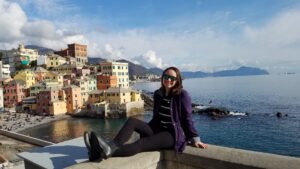
Leave a Reply
You must be logged in to post a comment.